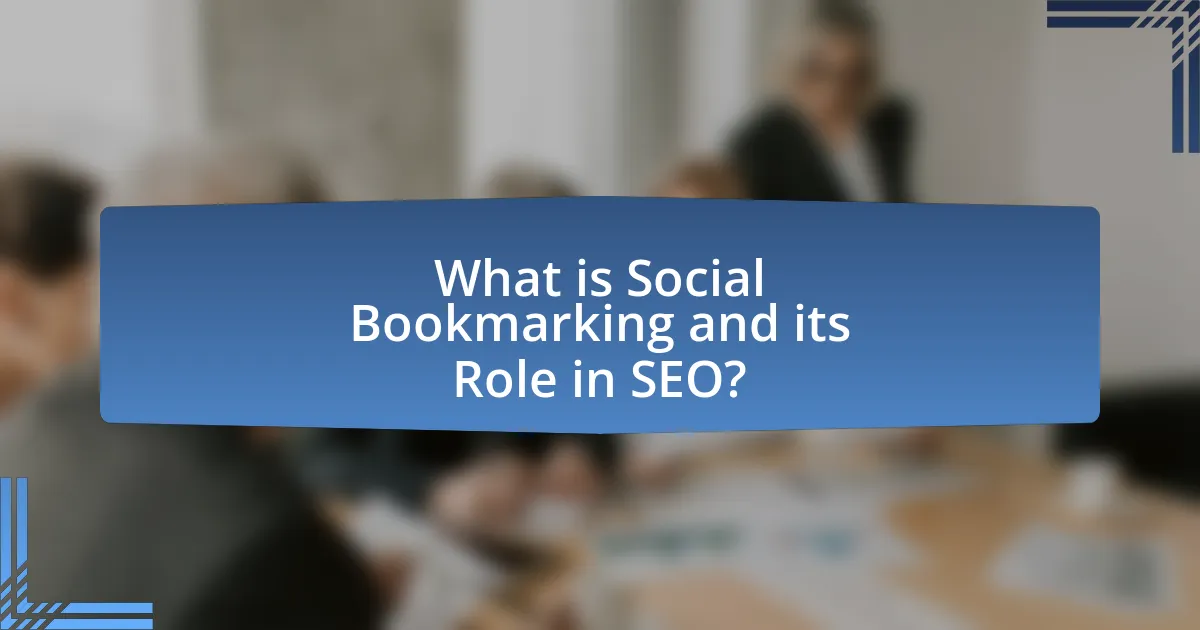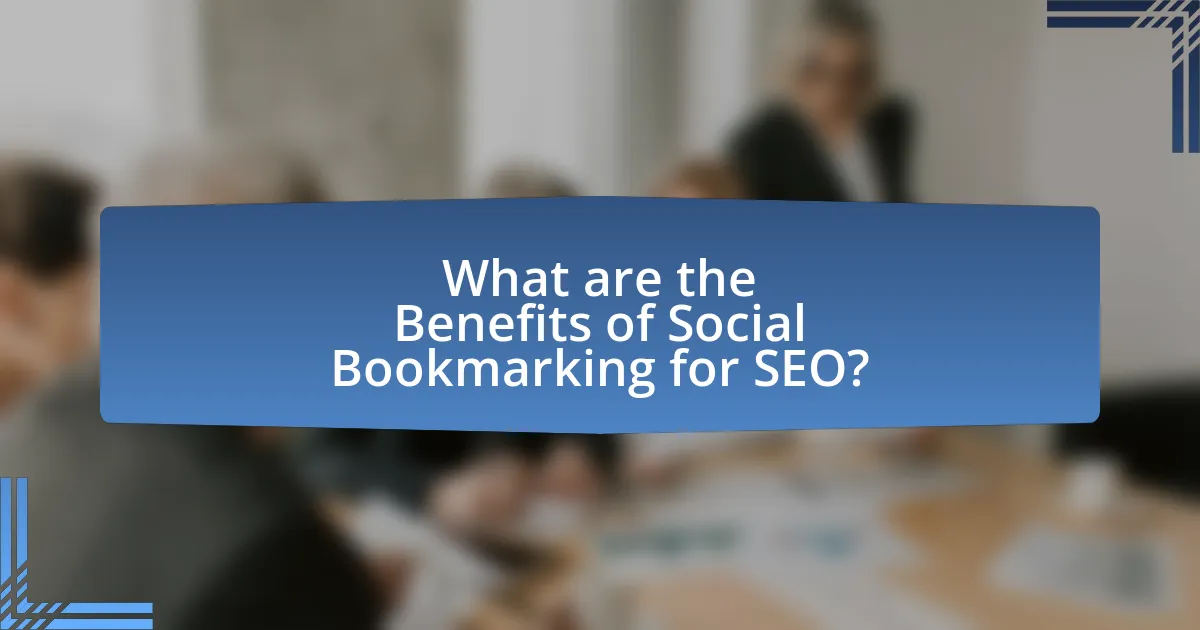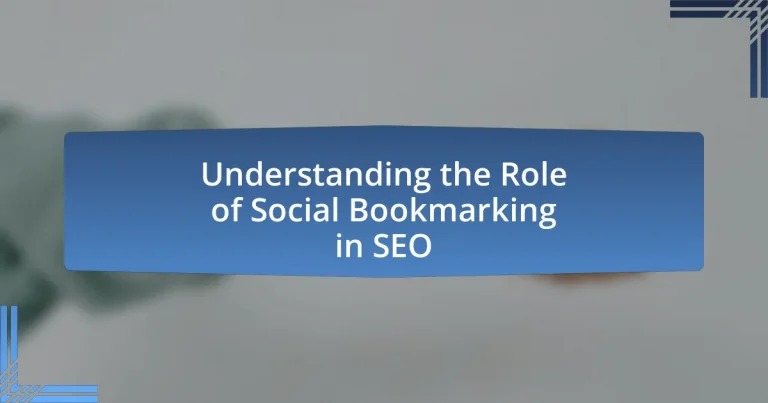Social bookmarking is a method for saving and organizing web pages through online platforms, significantly impacting search engine optimization (SEO) by enhancing website visibility and driving traffic. This article explores how social bookmarking functions within SEO, highlighting its role in generating backlinks, improving search engine rankings, and increasing content discoverability. Key features of social bookmarking platforms, user interaction methods, and the importance of community engagement are discussed, along with best practices for effectively utilizing social bookmarking in SEO strategies. Additionally, the article addresses potential drawbacks and common mistakes to avoid, providing practical tips for maximizing the benefits of social bookmarking in enhancing online presence and authority.

What is Social Bookmarking and its Role in SEO?
Social bookmarking is a method of saving and organizing web pages through online platforms, allowing users to easily access and share links. In the context of SEO, social bookmarking plays a significant role by enhancing website visibility and driving traffic. When users bookmark a page, it can lead to increased backlinks, which are crucial for improving search engine rankings. Additionally, social bookmarking sites often have high domain authority, meaning that links from these platforms can positively influence a site’s credibility and search performance. Studies have shown that pages shared on social bookmarking sites can receive more traffic and engagement, further supporting their importance in an effective SEO strategy.
How does social bookmarking function in the context of SEO?
Social bookmarking functions in the context of SEO by allowing users to save, organize, and share web pages, which can enhance visibility and traffic to those pages. When users bookmark a page, it creates backlinks that search engines recognize, contributing to the page’s authority and ranking. Additionally, social bookmarking sites often have high domain authority, meaning links from these platforms can significantly impact a website’s SEO performance. For instance, a study by Moz indicates that backlinks from high-authority domains can improve search engine rankings, validating the importance of social bookmarking in an effective SEO strategy.
What are the key features of social bookmarking platforms?
Social bookmarking platforms primarily feature user-generated content organization, allowing users to save, categorize, and share web links. These platforms typically include tagging systems for easy retrieval, social interaction elements such as commenting and following, and community-driven content discovery through voting or rating systems. For instance, platforms like Delicious and Reddit enable users to curate collections of links based on personal interests, enhancing visibility and engagement. The effectiveness of these features is supported by data indicating that social signals can influence search engine rankings, thereby playing a significant role in SEO strategies.
How do users interact with social bookmarking sites?
Users interact with social bookmarking sites by creating, sharing, and organizing links to web content. This interaction typically involves registering for an account, submitting URLs, tagging them with relevant keywords, and categorizing them for easier retrieval. According to a study by the Pew Research Center, 34% of internet users have utilized social bookmarking services to save and share content, highlighting the popularity and utility of these platforms in content discovery and organization. Users also engage with others by following their bookmarks, commenting on shared links, and participating in community discussions, which fosters a collaborative environment for content curation.
Why is social bookmarking important for SEO strategies?
Social bookmarking is important for SEO strategies because it enhances website visibility and drives traffic. By allowing users to save and share links to content, social bookmarking platforms create backlinks that improve a site’s authority and search engine ranking. According to a study by Moz, backlinks are a significant ranking factor, with high-quality links contributing to better search engine results. Additionally, social bookmarking can increase content discoverability, as users often browse these platforms for new information, leading to higher engagement and potential conversions.
What impact does social bookmarking have on website visibility?
Social bookmarking significantly enhances website visibility by increasing the likelihood of content discovery and sharing. When users bookmark a website on social platforms, it creates backlinks that improve search engine rankings, as search engines recognize these links as indicators of quality and relevance. According to a study by Moz, websites with a higher number of social bookmarks tend to rank better in search results, demonstrating a direct correlation between social bookmarking activity and improved visibility.
How does social bookmarking influence search engine rankings?
Social bookmarking influences search engine rankings by generating backlinks and increasing content visibility. When users bookmark a webpage on social bookmarking sites, it creates links that search engines recognize, contributing to the site’s authority and relevance. Additionally, increased traffic from these platforms signals to search engines that the content is valuable, which can improve its ranking. Studies have shown that pages with higher social engagement tend to rank better in search results, as search engines prioritize content that is widely shared and linked.

What are the Benefits of Social Bookmarking for SEO?
Social bookmarking benefits SEO by enhancing website visibility and driving traffic. When users bookmark a webpage, it increases the chances of that page being shared, which can lead to more backlinks. Backlinks are crucial for SEO as they signal to search engines that the content is valuable and trustworthy. According to a study by Moz, backlinks are one of the top factors influencing search engine rankings. Additionally, social bookmarking can improve indexing speed, as search engines often crawl these platforms to discover new content. This means that fresh content can be indexed more quickly, leading to faster visibility in search results.
How can social bookmarking enhance content discovery?
Social bookmarking enhances content discovery by allowing users to save, organize, and share links to web content, thereby increasing visibility and accessibility. When users bookmark content, they create a network of shared resources that can be easily searched and accessed by others, leading to greater exposure for the bookmarked content. According to a study by the Pew Research Center, 34% of internet users have utilized social bookmarking sites, indicating a significant user base that actively engages in content sharing. This engagement not only drives traffic to the original content but also improves its ranking in search engine results, as search engines recognize the increased relevance and authority of frequently bookmarked pages.
What role does social sharing play in content promotion?
Social sharing significantly enhances content promotion by increasing visibility and engagement. When users share content on social media platforms, it reaches a broader audience, leading to higher traffic and potential backlinks. According to a study by BuzzSumo, content that is shared on social media receives 8 times more engagement than content that is not shared. This amplification effect not only boosts the content’s reach but also improves its search engine ranking, as search engines consider social signals as indicators of quality and relevance.
How does user engagement through bookmarking affect SEO?
User engagement through bookmarking positively affects SEO by signaling content relevance and quality to search engines. When users bookmark a webpage, it indicates that they find the content valuable enough to save for future reference, which can lead to increased traffic and improved rankings. Research shows that pages with higher user engagement metrics, such as bookmarks, tend to rank better in search engine results. This is because search engines prioritize content that demonstrates user interest and interaction, ultimately enhancing visibility and authority in search results.
What are the potential drawbacks of relying on social bookmarking?
Relying on social bookmarking can lead to several potential drawbacks, including the risk of link decay, dependency on third-party platforms, and limited control over content visibility. Link decay occurs when bookmarks lose relevance or are deleted, diminishing their SEO value over time. Dependency on platforms like Delicious or Diigo means that changes in their policies or functionality can directly impact users’ bookmarking strategies. Additionally, users have limited control over how their content is displayed or ranked within these platforms, which can affect traffic and engagement. These factors highlight the inherent risks associated with relying solely on social bookmarking for SEO strategies.
How can spam and low-quality links impact SEO negatively?
Spam and low-quality links can negatively impact SEO by lowering a website’s authority and trustworthiness in the eyes of search engines. When a site is linked to spammy or low-quality sources, search engines like Google may interpret this as a sign of poor content quality or manipulative practices, leading to lower rankings in search results. According to Google’s guidelines, engaging in link schemes or acquiring links from low-quality sites can result in penalties, which can severely diminish organic traffic. Additionally, a study by Moz indicates that backlinks from reputable sites significantly enhance a site’s ranking potential, while links from spammy sources can have the opposite effect, further validating the detrimental impact of such links on SEO.
What are the risks of overusing social bookmarking for SEO?
Overusing social bookmarking for SEO can lead to penalties from search engines, reduced credibility, and diminished user engagement. Excessive bookmarking may trigger spam filters, resulting in a website being penalized or de-indexed by search engines like Google, which prioritize quality over quantity in link building. Additionally, if users perceive a site as spammy due to over-saturation of bookmarks, it can harm the site’s reputation and trustworthiness. Research indicates that a balanced approach to link building, including social bookmarking, is essential for maintaining a healthy SEO strategy.

How to Effectively Use Social Bookmarking for SEO?
To effectively use social bookmarking for SEO, focus on sharing high-quality content on reputable social bookmarking sites to enhance visibility and drive traffic. Engaging with platforms like Reddit, Digg, and StumbleUpon allows users to discover and share your content, which can lead to increased backlinks and improved search engine rankings. Research indicates that social signals, such as shares and bookmarks, can positively influence SEO performance by indicating content relevance and popularity to search engines. For instance, a study by Moz found that social media engagement correlates with higher search rankings, demonstrating the importance of social bookmarking in an SEO strategy.
What best practices should be followed for social bookmarking?
To effectively utilize social bookmarking, users should focus on creating high-quality, relevant content and engaging with the community. High-quality content attracts more bookmarks and shares, enhancing visibility and traffic. Engaging with the community through comments and discussions fosters relationships and encourages reciprocal bookmarking. Additionally, using appropriate tags and categories improves discoverability, as studies show that well-tagged content is more likely to be found by users searching for specific topics. Consistency in sharing and bookmarking content also plays a crucial role, as regular activity keeps users engaged and increases the likelihood of content being shared.
How can you choose the right social bookmarking sites?
To choose the right social bookmarking sites, prioritize platforms that align with your target audience and content niche. Popular sites like Reddit and StumbleUpon attract diverse users, while niche-specific platforms like Digg cater to particular interests. Research the site’s user demographics, engagement levels, and SEO benefits, as sites with high domain authority can enhance your content’s visibility. For instance, a study by Moz indicates that backlinks from high-authority sites significantly improve search engine rankings. Therefore, selecting social bookmarking sites with strong user engagement and relevance to your content will maximize your SEO efforts.
What strategies can maximize the benefits of social bookmarking?
To maximize the benefits of social bookmarking, users should focus on selecting relevant platforms, engaging with the community, and optimizing their content for visibility. Choosing platforms that align with the target audience enhances the likelihood of reaching interested users, as evidenced by studies showing that niche platforms can drive more targeted traffic. Actively participating in discussions and sharing valuable content fosters relationships and encourages reciprocal sharing, which can increase the reach of bookmarks. Additionally, optimizing titles, descriptions, and tags with relevant keywords improves searchability, as research indicates that well-optimized content is more likely to be discovered and shared, thereby amplifying its impact on SEO.
What tools can assist in managing social bookmarking efforts?
Tools that can assist in managing social bookmarking efforts include Diigo, Delicious, and Pinboard. Diigo allows users to save and organize bookmarks, annotate web pages, and share them with others, enhancing collaboration. Delicious offers a platform for saving, sharing, and discovering web links, making it easier to manage bookmarks and find relevant content. Pinboard provides a simple interface for saving bookmarks and offers features like tagging and archiving, which streamline the bookmarking process. These tools facilitate efficient organization and sharing of online resources, which is crucial for effective social bookmarking in SEO strategies.
How do social media management tools integrate with bookmarking?
Social media management tools integrate with bookmarking by allowing users to save and organize links to content across various platforms, facilitating easy sharing and engagement. These tools often feature bookmarking functionalities that enable users to categorize and tag content, making it accessible for future reference and sharing on social media channels. For instance, tools like Buffer and Hootsuite provide options to bookmark articles or posts, which can then be scheduled for sharing, enhancing content visibility and driving traffic. This integration supports SEO efforts by increasing the likelihood of backlinks and social signals, which are critical for search engine rankings.
What analytics can be used to measure the effectiveness of social bookmarking?
To measure the effectiveness of social bookmarking, key analytics include referral traffic, social shares, and engagement metrics. Referral traffic indicates the number of visitors directed to a website from social bookmarking sites, which can be tracked using tools like Google Analytics. Social shares quantify how often content is saved or shared on bookmarking platforms, reflecting its popularity and reach. Engagement metrics, such as time spent on page and bounce rate, provide insights into user interaction with the content, helping to assess its relevance and quality. These analytics collectively demonstrate the impact of social bookmarking on website visibility and user engagement.
What are some common mistakes to avoid in social bookmarking?
Common mistakes to avoid in social bookmarking include using irrelevant tags, which can hinder discoverability, and neglecting to engage with the community, leading to missed networking opportunities. Additionally, over-promoting content without providing value can result in negative perceptions and reduced credibility. Failing to update bookmarks regularly can also lead to outdated information, diminishing the effectiveness of the strategy. These mistakes can significantly impact the overall success of social bookmarking efforts in enhancing SEO.
How can improper tagging affect your SEO efforts?
Improper tagging can significantly hinder your SEO efforts by leading to poor indexing and reduced visibility in search engine results. When tags are incorrectly applied, search engines may struggle to understand the content’s relevance and context, resulting in lower rankings. For instance, a study by Moz indicates that proper use of tags can improve click-through rates by up to 30%, while improper tagging can negate these benefits, causing content to be overlooked. Additionally, incorrect tags can confuse users, leading to higher bounce rates, which further negatively impacts SEO performance.
What are the consequences of neglecting user engagement?
Neglecting user engagement leads to decreased customer loyalty and reduced conversion rates. When users feel disconnected from a brand or platform, they are less likely to return, resulting in a decline in repeat visits and purchases. Research indicates that companies with high user engagement see a 23% increase in revenue, while those that ignore engagement strategies often experience stagnation or decline in growth. Furthermore, low engagement can negatively impact search engine rankings, as algorithms favor sites with active user interactions, thereby diminishing visibility and traffic.
What practical tips can enhance your social bookmarking strategy?
To enhance your social bookmarking strategy, focus on selecting relevant platforms that align with your target audience. Utilizing platforms like Reddit, Digg, and StumbleUpon can increase visibility, as these sites have established user bases interested in specific topics. Additionally, consistently sharing high-quality, valuable content encourages user engagement and sharing, which can lead to increased backlinks and improved SEO performance. Research indicates that social signals, such as shares and bookmarks, can positively influence search engine rankings, making it essential to prioritize quality over quantity in your bookmarking efforts.


